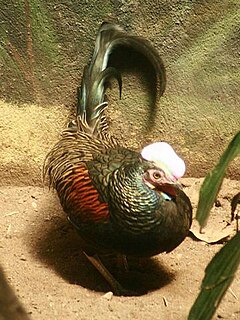Junglefowl
| Junglefowl Temporal range: Late Miocene-Holocene |
|
|---|---|
 |
|
| Green junglefowl, (Gallus varius) cock | |
| Scientific classification | |
| Kingdom: | Animalia |
| Phylum: | Chordata |
| Class: | Aves |
| Order: | Galliformes |
| Family: | Phasianidae |
| Subfamily: | Phasianinae |
| Genus: |
Gallus Brisson, 1760 |
| Species | |
|
|
Junglefowl are the four living species of bird from the genus Gallus in the Gallinaceous bird order, which occur in India, Sri Lanka and Southeast Asia.
These are large birds, with colourful male plumage, but are nevertheless difficult to see in the dense vegetation they inhabit.
As with many birds in the pheasant family, the male takes no part in the incubation of the egg or rearing of the precocial young. These duties are performed by the drab and well-camouflaged female.
The junglefowl are seed-eaters, but insects are also taken, particularly by the young birds.
One of the species in this genus, the red junglefowl, is of historical importance as the likely ancestor of the domesticated chicken, although it has been suggested the grey junglefowl was also involved.
The Sri Lankan junglefowl is the national bird of Sri Lanka.
Prehistorically, the genus Gallus was found all over Eurasia; in fact it appears to have evolved in southeastern Europe. Several fossil species have been described, but their distinctness is not firmly established in all cases:
...
Wikipedia
